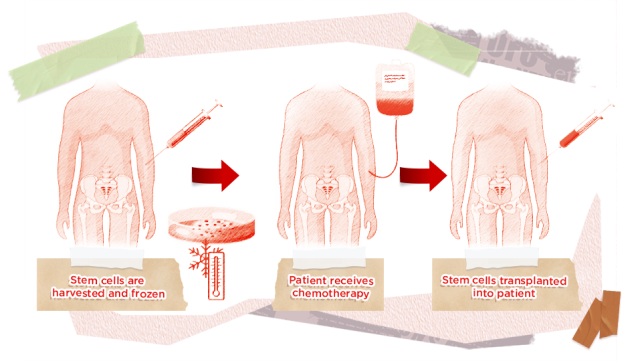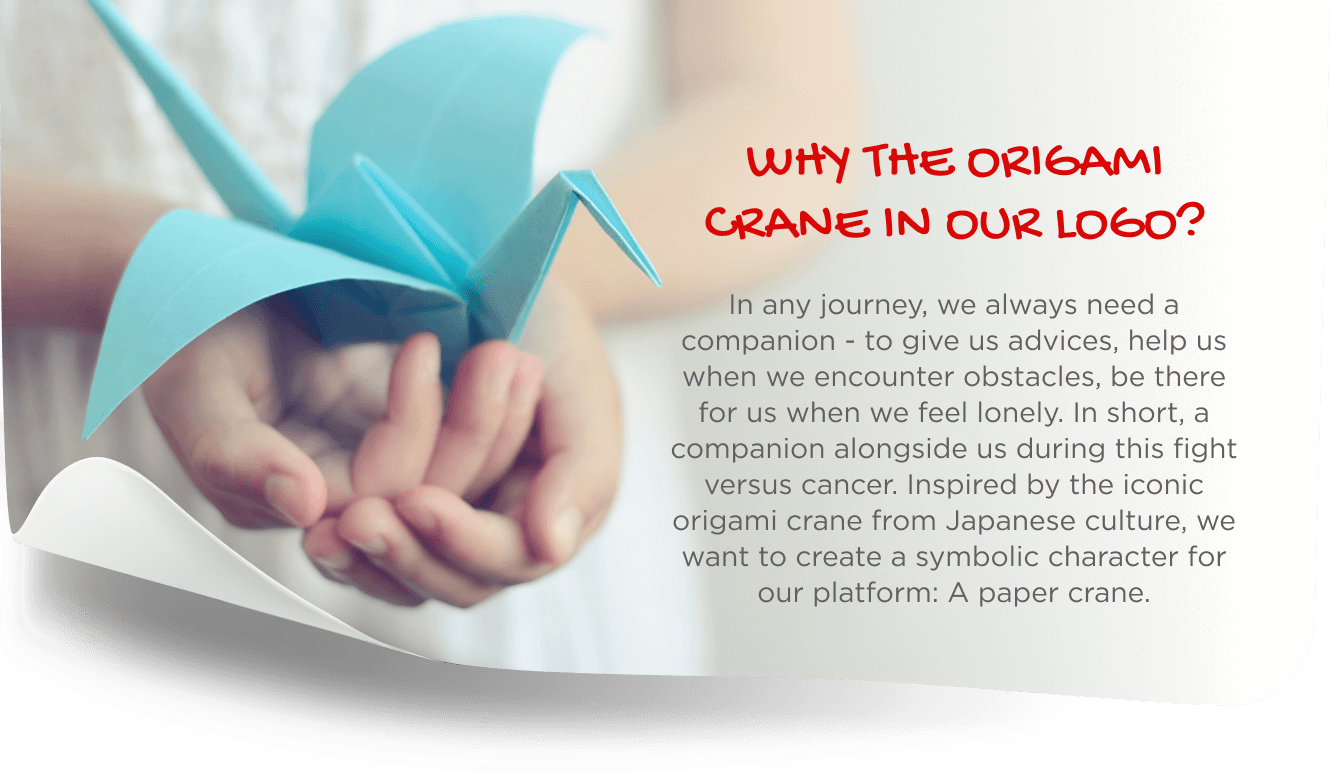Stem cell transplant (SCT) or bone marrow transplant is an alternative treatment for multiple myeloma.
The bone marrow and blood stream contains specialized cells that have the ability to divide into many different cell types. These are called hematopoietic stem cells or blood stem cells. In a bone marrow or stem cell transplant, healthy blood stem cells are transplanted into your bone marrow or blood. They help restore the red blood cells, white blood cells and platelets that perform important functions in your blood.
There are 2 main types of stem cell transplants:
-
AUTOLOGOUS STEM CELL TRANSPLANT
This is the most common type of SCT, where stem cells are harvested from the patient’s own body. -
ALLOGENEIC STEM CELL TRANSPLANT
In this type of SCT, stem cells are harvested from an another person, a matched donor. This is a riskier procedure, rarely used to treat multiple myeloma.

References:
- “NCCN Guidelines® Insights: Multiple Myeloma, Version 3.2022: Featured Updates to the NCCN Guidelines.” Journal of the National Comprehensive Cancer Network, vol. 20, no. 1, Jan. 2022, pp. 8–19.
- “Stem Cell Transplants for Multiple Myeloma | The MMRF.” Themmrf.Org, https://themmrf.org/multiple-myeloma/treatment-options/stem-cell-transplants/. Accessed 7 Apr. 2022.
Not everyone is eligible for a stem cell transplant.
Your doctor will assess your eligibility based on the following criteria:

- < 65 years: good candidate.
- 65 - 75 years: eligible depending on your overall health and extent of cancer.
- >75 years: not eligible.

Performance status:
You are eligible if you are able to carry on normal activity, only have minor signs and symptoms of the disease.

Performance status:
Your doctor will use scoring systems to assess whether you are in a low risk/ high risk category for a stem cell transplant.
Some of the criteria include:- Presence of abnormal chromosomal DNA changes.
- History of arrythmia or cardiac disease.
- Cerebrovascular disease (such as stroke).
- Diabetes and obesity.
- Inflammatory bowel disease or peptic ulcer.
- Infection or rheumatic disease.
References:
- “NCCN Guidelines® Insights: Multiple Myeloma, Version 3.2022: Featured Updates to the NCCN Guidelines.” Journal of the National Comprehensive Cancer Network, vol. 20, no. 1, Jan. 2022, pp. 8–19.
- “Multiple Myeloma Stem Cell Transplant: What to Expect.” Healthline, 11 June 2021, https://www.healthline.com/health/managing-multiple-myeloma/multiple-myeloma-stem-cell-transplant.
- Gay F, et al. From transplant to novel cellular therapies in multiple myeloma: European Myeloma Network guidelines and future perspectives. Haematologica. 2018;103(2):197-211.
Prior to stem cell transplant, you will have received induction therapy (usually standard triple therapy) for a few months at least.
Once assessed as eligible for a stem cell transplant you go through a 3 step-process.

Harvesting stem cells

- For myeloma treatment, blood stem cells are usually collected from the blood stream. This process can take up to 3 to 4 hours.
- A machine called apheresis machine separates the stem cells from the blood, returning the blood back into your body. The harvested stem cells are then frozen for future use.

Conditioning

- In this step, you will receive high-dose chemotherapy or radiation to kill all the cells including the myeloma cells residing in your bone marrow.
- This typically takes 1-2 weeks. Since the process also destroys the normal cells in your bone marrow, it greatly weakens your immune system increasing your chance for infections.

Transplanting the stem cells

- One or two days after chemotherapy, you are ready for the transplant.
- The harvested stem cells will be slowly introduced back into your body through a transfusion.
- Stem cell transplant can be an outpatient procedure and typically takes a few hours. You may still need to return to the hospital during the recovery period.
References:
- “NCCN Guidelines® Insights: Multiple Myeloma, Version 3.2022: Featured Updates to the NCCN Guidelines.” Journal of the National Comprehensive Cancer Network, vol. 20, no. 1, Jan. 2022, pp. 8–19.
- Stem Cell Transplants in Cancer Treatment - National Cancer Institute. 29 Apr. 2015, https://www.cancer.gov/about-cancer/treatment/types/stem-cell-transplant.
You may experience side effects at different stages of the stem cell transplant process.
Chemotherapy and radiation effects during conditioning

Fatigue

Nausea or vomiting

Diarrhea

Reduced appetite

Hair loss

Mouth ulcers
Stem cell infusion side effects

A strong garlicky taste or scent

Fever and chills

Shortness of breath

Hives

Reduced urination

Low blood pressure
If you have had an allogenic transplant, graft vs host’s disease is a serious side effect caused by the immune cells from the donor recognizing and attacking your own body as foreign.
Some long term side effects of stem cell transplant appear after a year or more and include frequent infections, extreme fatigue, low thyroid hormone, reproductive effects or problems in the major organs.
References:
- “Multiple Myeloma Stem Cell Transplant: What to Expect.” Healthline, 11 June 2021, https://www.healthline.com/health/managing-multiple-myeloma/multiple-myeloma-stem-cell-transplant.
- “Stem Cell Transplants for Multiple Myeloma | The MMRF.” Themmrf.Org, https://themmrf.org/multiple-myeloma/treatment-options/stem-cell-transplants/. Accessed 7 Apr. 2022.
The recovery process takes a few weeks to months. During this period you will stay in the hospital to receive follow-up care which may include:
- Isolation in a germ-free room
- Antibiotics to prevent infection
- Blood transfusions
- Other medication to counter side effects
- Regular blood tests to monitor progress
The transplanted cells begin to populate your bone marrow. This process is called engraftment. In about 2-4 weeks, these stem cells grow into different cell types restoring your blood cells to safe levels.
Following the transplant you will receive maintenance therapy to prevent relapse and keep your cancer at remission
WHAT CAN YOU DO TO PREVENT INFECTION

Wash hands frequently

Bathe or shower each day with mild soap and water)

Ensure personal hygeine

Avoid raw or undercooked food

Get vaccinated for flu
References:
- “NCCN Guidelines® Insights: Multiple Myeloma, Version 3.2022: Featured Updates to the NCCN Guidelines.” Journal of the National Comprehensive Cancer Network, vol. 20, no. 1, Jan. 2022, pp. 8–19.
- Stem Cell Transplants in Cancer Treatment - National Cancer Institute. 29 Apr. 2015, https://www.cancer.gov/about-cancer/treatment/types/stem-cell-transplant.
- “Multiple Myeloma Stem Cell Transplant: What to Expect.” Healthline, 11 June 2021, https://www.healthline.com/health/managing-multiple-myeloma/multiple-myeloma-stem-cell-transplant.







